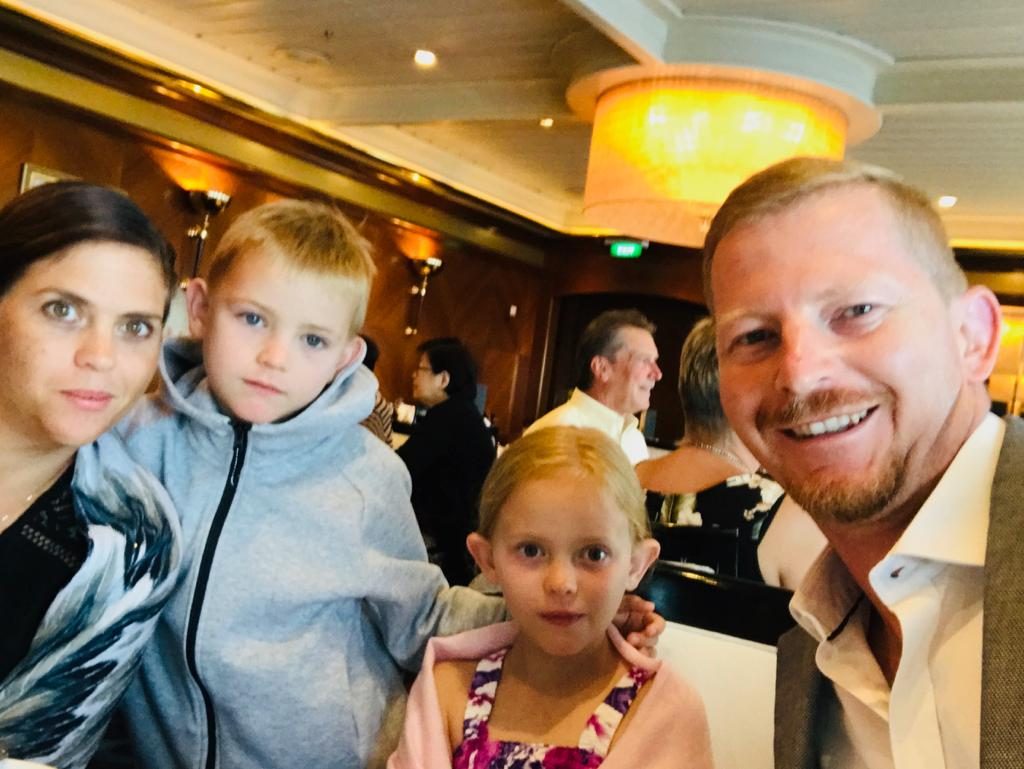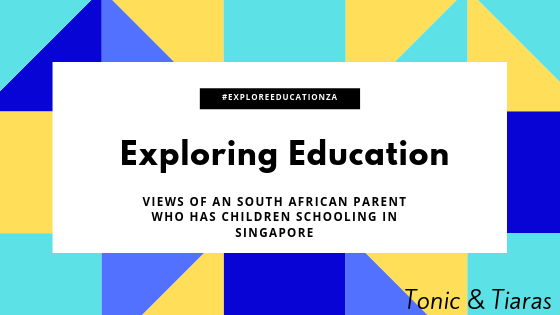As part of my Explore Education series, where I ask parents about the different types of education paths they have chosen for their children. I investigate the what, why, how and question them about their honest opinions about the system of education their children are currently experiencing. This week I am talking to Reinet whose children are in the International Baccalaureate education system, or IB for short.
Reinet has actually been one of my blogging cheerleaders always sharing and supporting me. Since her and her family have moved I have loved hearing about their adventures and how different life is overseas than here in South Africa.
Personal Perspective Questions:
Tell me a little about your family and the personality of your children.
We are a South African family living in Singapore for the last two years. Before that we spent seven years in Dubai. My son (A) was born in Dubai (and no we don’t get a different passport or a barrel of oil for that) and my daughter (E) was 14 months old when we left South Africa.
E is a complexed girl child, that would prefer to stay on the couch and read books instead of doing anything else. A is a typical boy, loves to move and do things. He is eager to learn as long as it doesn’t involve reading … (guess what my present challenge is – lol)

What does Education mean to you and your children?
Education is so much more than learning from a book. It’s about being real world ready and as such requires learning to be in all aspects of life. Their social and emotional well being and that of others need to be included.
What journey in education have you chosen and why?
We chose an the International Baccalaureate education system for the children because we felt it was a great way for the children to discover and learn. This is often referred to as the IB system. It is not all about reciting back what is in a book. It teaches children how to learn and think through enquiry, investigation, understanding and discussion.
The International Baccalaureate education system was also available in many countries so if we moved, they would always have the opportunity of staying with the same school system.
What school year do you follow i.e. January to December, or September to August?
Our school year runs from August to June.
How old were your children when they started school and was this right for your children? If not, how old do you believe kids should be when they start school?
My kids went to nursery from 12 months of age. It was a great way for them to learn social interaction and I was working part time as well. Both started school at age 5. No, I think we put to much pressure on children to soon.
I don’t know what would be better but personally I feel that at age 7 they may be more emotionally ready for it. That doesn’t mean they shouldn’t be exposed to education, it means they should be learning in a more play based environment as opposed to a set classroom environment.
What methods of schooling have you come across – give me your thoughts pros and or cons?
Home schooling: I love this idea but I can’t teach my own children (I would be locked up for murder) The pro’s: I think the individual attention to each child’s way of learning is great. Cheaper than any International schools. The con’s: they do lose out on the social aspect of school.
British Curriculum: Similar to what we had in SA. Very rigid, focused on academics more than anything else.
Do you believe that every child needs a participation medal?
Hell NO! I don’t get a medal to go to work or do the laundry. Teach the kids that there is value in winning (i.e. hard work is rewarded) but change the game so that it includes realistic challenges and includes all children.
I was lucky enough to attend a rugby coaching session with some amazing internatioinal coaches and their belief is that you need to teach the kids ALL the skills of rugby, not just what they are good at, so they score the rugby game differently. The kids get 1 point for a goal but they get 2 points for everytime they pass the ball. This teaches the kids the skill of passing the ball along the line and I believe that teaching in a classroom should also have a different SCORING system so that ALL the kids learn, ALL the skills.
Let’s talk about your family’s current schooling experience.
The Practical part:
Transport: How do they get to school everyday if they attend school outside the home
They go by bus in the morning (we have no car in Singapore) and they walk home in the afternoon.
What is the size of the school and the size of their class?
900 children from KG to Year 13 and we have been lucky to have an average class of 24 students with two adults.
What facilities does the school offer?
Swimming pool and sports fields, a Makers Space that teaches the kids about technology and crafting and a Music and Art room.
What is the start and end time of your typical school day?
8:20am to 3:20pm with 15 min snack and 1 hour lunch
Academic Programme:
What curriculum does your child follow?
The International Baccalaureate education Primary Years Programme
Does your child do homework after normal school hours? If so, what type of homework do they get and how many hours a week do they spend doing this homework?
Yes they get homework. A is in Year 2 and gets reading and spelling which usually takes up about 20 minutes per day (but feels like 5 million years).
E is in Year 4 and she has spelling, maths, reading and UIO (unit of inquiry) to complete and that would be 30 minutes per day.
Does the academic programme your child follows use technology? If so, to what extent?
Yes, it is used as a tool for research. It does not replace teaching in anyway. The school is very careful about the amount of hours the children use it and how they use it. Each year starts off with a lesson on how to responsibly use technology, online bullying as well as safety and security.
Sporting and cultural activities (in and outside of school)
Do you believe that sport and cultural activities are an important factor in your child’s life?
Yes, I do. Kids can learn so much from working and playing in groups.
Does your child participate in sport or cultural activities with their school? Please elaborate.
Yes, each term there is a selection process for after school activities provided for the school. My kids have participated in tennis, soccer, swimming, karate, yoga, 3D pen art, origami making, cooking classes, and Lego building.
Is there an additional cost involved in this?
If they are provided by outside teachers then there is a cost involved. Tennis and Karate has an additional cost.
Does your child participate in sport or cultural activities outside of their schooling structure? Please elaborate.
Yes, A plays rugby for Centaurs because the school doesn’t offer the sport and the teams and training are limited. Generally speaking in Singapore and in Dubai expats pay huge amounts to get coaching in sport as the schools very seldom have the capacity to deal with it.

School culture: What is your child’s school culture with regards to:
- Discipline: It is different to what I experienced growing up, especially because of the many different cultures the school has to deal with.
- Safety: Very safety conscious even though Dubai and Singapore are considered safe.
- Diversity: 50 different nationalities and kids with varying learning capabilities.
What is one thing that you wish could be done better within the structure you have chosen for your child’s educational journey?
I would like for the “learn at their own pace” to be more of a guided process. Kids do need a push and a bit of prodding to complete tasks/learning milestones and I believe if the kids fall too far behind their classmates it can lead to other issues like low self-esteem or behaviour problems.
I love the exposure the children have gotten to cultures and education. It has made me realise how adaptable kids and even adults can be.
This post was edited by Blue Media Edit.
